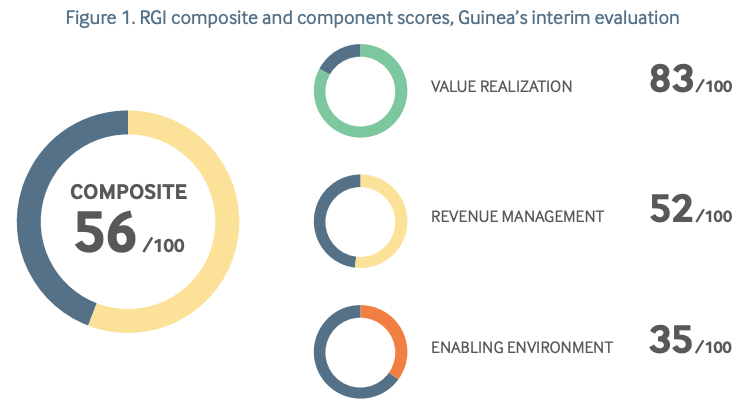
Resource Governance Index: 2019 Interim Evaluation Report for Guinea (Mining)
Français »
Read the press release.
Find more information, including the underlying data and justifications of Guinea’s interim evaluation, on the Resource Governance Index website.
This report presents the results and recommendations of an evaluation of mining governance in Guinea in 2017 and 2018, according to the methodology of the Resource Governance Index (RGI). NRGI has conducted this 2019 interim evaluation only for Guinea, in order to take stock of reforms implemented by the government of Guinea during 2017-2018 and to develop recommendations in a context of rapid growth of the country’s mining sector. Guinea’s 2019 results are not comparable to other countries assessed in the 2017 edition of the RGI, but they help to follow-up on Guinea’s trajectory over time.
In comparison to the 2017 edition of the RGI, Guinea gains 12 points with its overall score at 56 out of 100, allowing the country to move to a higher performance band. Many important improvements have taken place in the value realization component, where the rules and practices assessed are mostly under the responsibility of the Ministry of Mines and Geology. The score of this component is situated in the highest performance band due toa significant improvement in each of its subcomponents, especially licensing and governance of the state-owned enterprise SOGUIPAMI, and disaggregated sector data disclosures.
The revenue management component also evolves notably with a score of 52, in comparison to 27 in 2017. The Ministries of Budget, Mines and Geology and Regional Administration can accelerate this positive trend by implementing subnational transfers as part of the National fund for local development (Fonds national de développement local, FNDL) which will benefit all municipalities in Guinea. Concerning the third component,
enabling environment, the score decreases slightly.
The 2017 RGI edition revealed a significant gap between the average scores for laws (77) and practices (45) in Guinea. During the evaluation period of this interim report, this gap reduces by 17 points as a result of improved practices.
Read the press release.
Find more information, including the underlying data and justifications of Guinea’s interim evaluation, on the Resource Governance Index website.
This report presents the results and recommendations of an evaluation of mining governance in Guinea in 2017 and 2018, according to the methodology of the Resource Governance Index (RGI). NRGI has conducted this 2019 interim evaluation only for Guinea, in order to take stock of reforms implemented by the government of Guinea during 2017-2018 and to develop recommendations in a context of rapid growth of the country’s mining sector. Guinea’s 2019 results are not comparable to other countries assessed in the 2017 edition of the RGI, but they help to follow-up on Guinea’s trajectory over time.
In comparison to the 2017 edition of the RGI, Guinea gains 12 points with its overall score at 56 out of 100, allowing the country to move to a higher performance band. Many important improvements have taken place in the value realization component, where the rules and practices assessed are mostly under the responsibility of the Ministry of Mines and Geology. The score of this component is situated in the highest performance band due toa significant improvement in each of its subcomponents, especially licensing and governance of the state-owned enterprise SOGUIPAMI, and disaggregated sector data disclosures.
The revenue management component also evolves notably with a score of 52, in comparison to 27 in 2017. The Ministries of Budget, Mines and Geology and Regional Administration can accelerate this positive trend by implementing subnational transfers as part of the National fund for local development (Fonds national de développement local, FNDL) which will benefit all municipalities in Guinea. Concerning the third component,
enabling environment, the score decreases slightly.
The 2017 RGI edition revealed a significant gap between the average scores for laws (77) and practices (45) in Guinea. During the evaluation period of this interim report, this gap reduces by 17 points as a result of improved practices.
